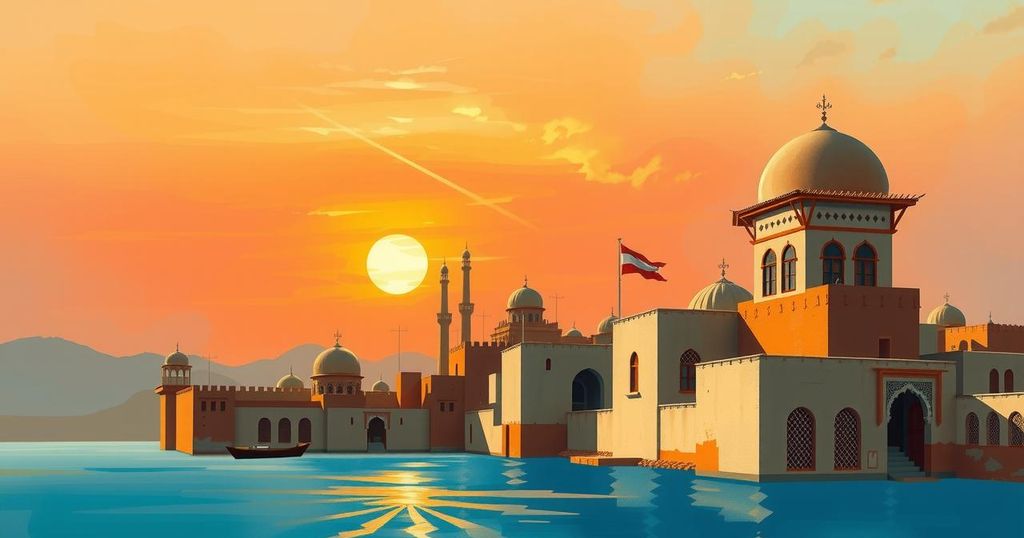Global news
ABBAS ARAGHCHI, AL, AL - MONITOR, ASIA, DIPLOMACY, ES, EUROPE, FOREIGN POLICY, GAZA, GAZA STRIP, GULF, GULF SULTANATE OF OMAN, IRAN, MIDDLE EAST, MUSCAT, NORTH AMERICA, NUCLEAR POLICY, OMAN, OMANI, QATAR, SANCTIONS, SAUDI ARABIA, STEVE WITKOFF, TRUMP, UKRAINE, UNITED ARAB EMIRATES, UNITED STATES, US, WITKOFF, YEMEN
Marcus Li
0 Comments
U.S. and Iran Make Progress in Nuclear Talks Ahead of Trump’s Gulf Trip
U.S. and Iran concluded nuclear talks in Oman, aiming to negotiate a deal. Trump administration expressed cautious optimism, while Iran’s response was more cautious. Both sides agreed to continue discussions, with significant implications for Trump’s Gulf visit this week.
In an intriguing turn of events, U.S. and Iranian negotiators wrapped up a round of nuclear talks in Oman on Sunday, expressing hopes of moving forward. A senior official from the Trump administration remarked, “We are encouraged by today’s outcome and look forward to our next meeting, which will happen in the near future,” implying a focus on working through the technical intricacies of a potential agreement.
Iran’s response, however, was notably more tempered. Esmaeil Baqaei, spokesman for Iran’s foreign ministry, described the discussions as “difficult but useful,” indicating that further coordination will take place through Oman. Reportedly, the negotiations are proceeding in a promising direction, with sources noting the urgency as President Trump seeks a diplomatic victory during his Gulf tour, especially amid stalled deals in Gaza and Ukraine.
During the three-hour meeting, top U.S. negotiator Steve Witkoff and Iranian Foreign Minister Abbas Araghchi engaged in both behind-the-scenes messaging and direct face-to-face discussions. Sayyid Badr Al-Busaidi, Oman’s foreign minister, adeptly facilitated the exchanges between the two sides, showcasing Oman’s pivotal role in these diplomatic efforts.
Trump’s upcoming visits to Saudi Arabia, Qatar, and the United Arab Emirates emphasize his preference for negotiation over military options as a means to address the increasingly pressing nuclear activities of Iran. However, there seems to be inconsistency in the administration’s stance regarding Iran’s nuclear enrichment. While Trump has yet to convey his final decision, Witkoff publicly asserted a firm line, saying, “No enrichment,” explaining the need for Iran’s facilities to be dismantled.
In contradiction, Secretary of State Marco Rubio suggested that Iran may retain a civilian nuclear program but with strict conditions on sourcing enriched materials externally. This mixed messaging raises questions on whether the U.S. is genuinely uncertain about its stance or intentionally maintaining ambiguity to aid negotiations. Iranian officials, however, remain steadfast, asserting their right to domestic enrichment as non-negotiable.
Notably, Trump abandoned the nuclear agreement forged under former President Barack Obama, which limited Iran’s nuclear program in exchange for sanctions relief. Since then, Iran has shifted from adhering to the deal to enriching uranium at levels nearing weapons-grade. As of now, Iran is believed to have accumulated sufficient nuclear material to potentially manufacture six nuclear bombs if further processed.
The focus of the ongoing discussions revolves squarely on Iran’s nuclear ambitions, with other contentious issues such as Iran’s missile programs and proxy activities to be deferred. Witkoff emphasized that adding extra topics could derail the currently fragile negotiations, a concern echoed by sources in Oman.
As Trump prepares for discussions in Saudi Arabia on Tuesday, the evolving dynamics of Iran’s nuclear program will undoubtedly take center stage. Reflecting on a shift in regional relationships, Gulf states now show a more favorable stance towards these negotiations — a shift from the previous atmosphere in 2015 when fears of a prospective deal favored Iran.
Recent diplomatic interactions have also shown progress; prior to the talks, Araghchi held meetings in Jeddah and Doha with officials from Saudi Arabia and Qatar, signaling a warming of ties in the region. This pronounced commitment to economic collaboration over conflict presents an intriguing backdrop for these high-stakes talks stemming from Muscat.
Overall, the recent nuclear talks in Oman between the U.S. and Iran illustrate a cautiously optimistic approach from both sides, with a shared focus on the technicalities of a potential agreement. While President Trump seeks a diplomatic breakthrough amid broader regional tensions, the intricacies of negotiation regarding Iran’s nuclear capabilities remain convoluted. The outcome of these discussions could significantly impact the geopolitical landscape in the Gulf, with implications far beyond just nuclear issues.
Original Source: www.al-monitor.com




Post Comment